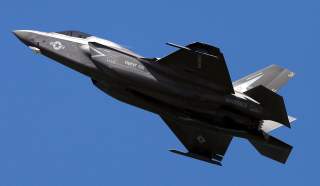Russia Has Put the F-35 on Notice: "An F-35 Will Never Be Alone"
What does that mean?
Why would an official diplomatic body like the Russian Embassy tweet something of this kind?
In a move that would raise eyebrows even by Cold War standards of political saber-rattling, the Russian Embassy in Washington seemed to threaten America’s F-35 fighter with Vietnam-era propaganda footage.
(This first appeared earlier in the year.)
Last month, the official handle of the Russian Embassy in the US tweeted the following update:
'If a Russia... ever was to see an F-35 inside its airspace', we would love to send Chief of Staff of the @usairforce Gen. David L. Goldfein 'message with two words' — ‘remember Vietnam'
'An F-35 will never be alone'
As observed by Foxtrot Alpha, the tweet is a direct reference to a recent Brookings Institution lecture given by Air Force chief of staff Gen. David Goldfein. During his talk, General Goldfein gave this assessment of the F-35’s capabilities:
“If a China or a Russia or another adversary on the globe ever were to see an F-35 inside their airspace,” Goldfein said. “I would love to send them all messages with two words — ‘we’re here. “It’s not ‘I’m here,’” he said. “An F-35 will never be alone.”
Several outlets have offered important insight into Goldfein’s speech, noting that his comments came on the heels of a successful F-35s performance at the annual Red Flag exercise in Nevada. At the same Brookings event, Goldfein stressed that the F-35 exceeded “our expectations when it comes to not only being able to survive, but to prosecute targets."
Less covered, however, is the context behind the Russian response. On the surface, it’s clearly a play-on-words intended as a dig at the F-35’s stealth capabilities; that is, an F-35 “will never be alone” in Russian airspace because Russian anti-air systems will detect it.
The Vietnam propaganda footage is also straightforward, considering the massive losses sustained by the US Air Force during the Vietnam War. These losses were, in no small part, due to the hundreds of air defense systems-- most prolifically, the S-75 Dvina-- and anti-air cannons funneled by the Soviets to the Viet Cong.
Still, there are some deeper subtexts worth considering. First, the Kremlin is engaged in a long-running PR campaign to sell potential investors on the viability of their Su-57 stealth fighter program. In the sense that these efforts have always included potshots at the competing F-35, the tweet would not be at all unusual if written by a Russian political commentator or military analyst. In fact, it almost certainly would have never been covered by major media outlets if it didn’t come from the Russian Embassy.
But if the lead is the source and not the content, then what explains the former? Why would an official diplomatic body like the Russian Embassy tweet something of this kind?
This is perhaps the most aggressive illustration of a new Russian rhetorical approach. In the early and mid 2010’s, standard Kremlin practice was to simply ignore western aspersions against Russian military capabilities. But over the recent years, Russian officials have made an increasingly dramatic point of publicly responding to these types of comments. As one recent example, it was only a few months ago that the Russian Ministry of Defense issued a biting reply to the US Ambassador to Colombia, who dismissed the Tu-160 bomber as little more than a museum piece.
This strategy is perhaps not without a rationale. At a time when the Kremlin is actively signaling both its nuclear and conventional deterrent capabilities to NATO, they may very well believe that even an indirect slight against Russian air defense systems cannot go unanswered.
Mark Episkopos is a frequent contributor to The National Interest and serves as research assistant at the Center for the National Interest. Mark is also a PhD student in History at American University.

